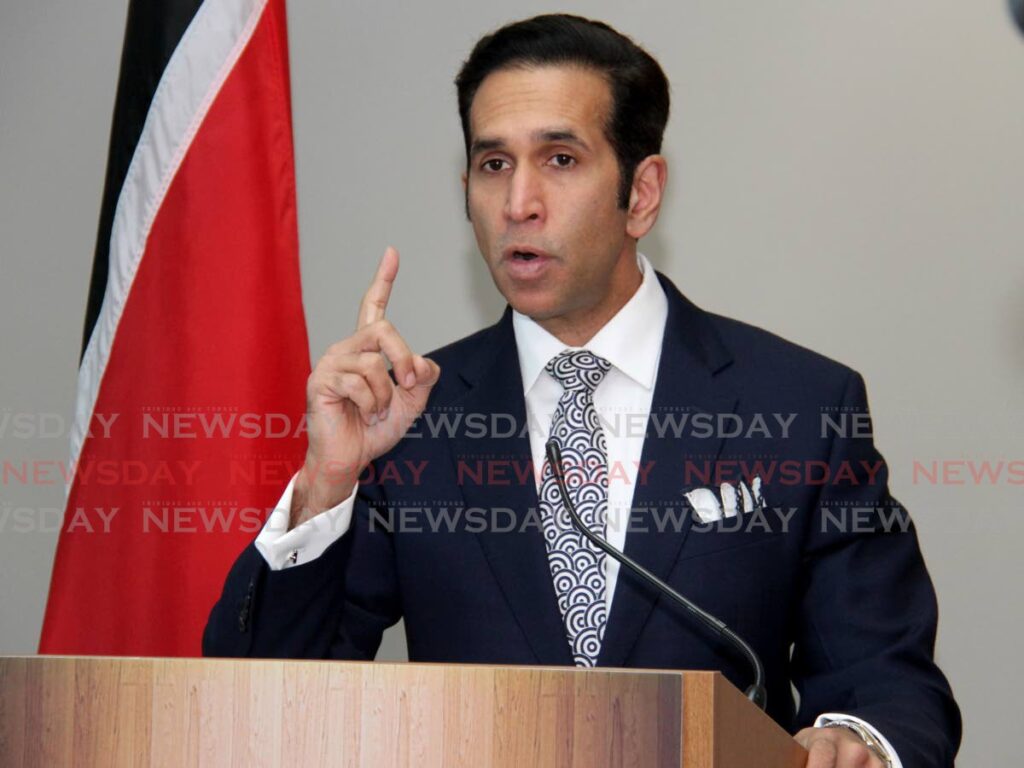Attorney General takes Augustine, THA to court over Duke

DEPUTY CHIEF Secretary Watson Duke’s position in the Tobago House of Assembly (THA) has found its way in the courts.
On Thursday, Attorney General Faris Al-Rawi (AG) filed a construction summons in the High Court to interpret a section of the Tobago House of Assembly (THA) Act as it relates to Watson Duke’s appointment as deputy chief secretary while also serving as head of the Public Service Association (PSA) and a member of the registration, recognition and certification board (RRCB).
The claim says Duke receives remuneration from the PSA and the RRCB. The latter falls under the Ministry of Labour and deals exclusively with the recognition of a trade union by an employer and matters related to this.
The filing of the construction, or interpretation, summons, which seeks to have the court interpret the law as it relates to a particular issue, comes immediately after the THA election on December 6, in which Duke’s Progressive Democratic Patriots won 14 of the 15 seats.
It also follows warnings by the Attorney General to Chief Secretary Farley Augustine, of a conflict of interest in Duke’s appointment as deputy chief secretary.
Augustine gave Duke a three-month ultimatum to put his house in order, but Al-Rawi insisted the PSA president had to step down from the union immediately.
Duke tendered his resignation from the PSA, effective December 31, however, Augustine was challenged by the AG to act immediately prompting him to respond earlier this week.

At a post- THA council meeting on Wednesday, Augustine said the issue of any conflict had been resolved with Duke’s tendering his resignation from the PSA. Augustine, however, maintained the THA did not answer to the AG.
The latest salvo was Al-Rawi’s attorneys filing the interpretation summons in the High Court to resolve the conflict issue.
In a release on the filing, the Office of the AG said it received inquiries from both the RRCB and the chief personnel officer on Duke’s status as president of the PSA, the majority union for public officers.
It said before filing the application, the AG received advice from several senior counsel who “all agreed that there was an issue to be decided by the court” regarding Duke’s appointment to the executive council of the THA and his participation for remuneration in other bodies.
The statement made it clear the application did not seek to “unseat the election” of anyone to the THA’s assembly or executive council.
“It merely seeks to clarify the law in the THA Act, as well as the Integrity in Public Life Act, Chap. 22:01, regarding the prohibition against a secretary of the THA and a person in public life, engaging in activities which would be in conflict with his duties as a secretary.”
The release said the approach of approaching the court for clarification of the law “will redound to the benefit and best interest of the citizens of Trinidad and Tobago.

“The court’s ultimate ruling will certainly assist in the maintenance of confidence in the THA and will avoid unwanted challenges that may be taken against any and/or all actions and/or decisions taken and/or made by the executive council thereby ensuring transparency and protecting against challenges of unlawfulness.”
Calls to Augustine’s and Duke’s cellphones went to voicemail while messages sent were not returned.
Speaking on the claim at a Housing Development Corporation (HDC) key-distribution ceremony in San Fernando on Thursday evening, Al-Rawi said that he felt obliged to clarify the law on the matter and found it prudent to ask the court for that interpretation on an urgent basis.
"The reason that this is important is that the last thing we would want to do is to expose the THA to having its decisions challenged. Because if there is a position of an unlawful holding of office, then you could find decisions etc coming into odium.
"And, therefore, we must protect the people of Tobago and the people of TT from having capricious actions brought or challenges brought to decisions that may be made."
Earlier, Al-Rawi was asked to respond to Augustine's assertion that he did not take instructions from the AG.
Al-Rawi replied, "Mr Augustine is the THA's Chief Secretary and he's a man that I have, obviously, great regard for. I am quite confident that, perhaps, he was a little bit more on the jesting side than that. I'm sure that the Chief Secretary of the THA would understand that the AG is the AG for the Republic of Trinidad and Tobago and my duty is to assist him and to assist all of the people of TT."
The AG’s claim names the THA, Duke, and Augustine as defendants in the action.
The AG wants to know if a secretary of the THA can also hold the post of president of the PSA and be a member of the RRCB or if it was in conflict with the THA Act and the Integrity of Public Life Act.
The claim also seeks a declaration on the proper construction of the THA Act to determine the law allows or prohibits, a member of the executive council from acting in a position that carries an entitlement to profit or remuneration even if the person “foregoes receipt of such profit or remuneration,” as was initially the case with Duke before he tendered his resignation.
The claim said secretaries of the THA were appointed by the President with the advice of the Chief Secretary and the Executive Council and are “responsible for carrying out the functions of the assembly.”
Duke has not been assigned a particular portfolio in the THA, other than being named deputy chief secretary. He is an assemblyman having won the Roxborough/ Argyle district on December 6.
The AG’s claim said it was clear all assemblymen were required to impartially discharge their duties and responsibilities.
“This is apparent from the terms of the specific oath or affirmation which they are required to make in order to assume office.”
The claim said the emphasis on “impartiality and the avoidance of potential conflicts of interest” arises in the current scenario. It also pointed that members of the assembly were declared to be persons in public life under the Integrity of Public Life Act.
Under the Industrial Relations Act, the claim said the PSA was entitled to enter into collective bargaining and treat and negotiate on behalf of members with the various state agencies which employ them and have to represent them in any dispute.
Citing the Public Service Commission (Delegation of Powers) Order, the claim said the chief administrator of the assembly exercised extensive delegated powers of the Public Service Commission relating to employment in the public service.
The claim set out the history leading up to Duke’s resignation and the relevant correspondence the AG sent to Augustine.
It pointed out that on Monday, Duke wrote to the Conference of Delegates of the PSA offering his resignation but said it “did not provide in this letter any explanation as to why he did not simply resign immediately, or at all, and neither did he state what would occur if his offer of resignation were not accepted ”
It also said Duke did not offer any explanation on why he did not decline the “appointment as a secretary in the first place, pending whatever period he required to place his affairs in order.”
It also said Augustine has, to date, “neither acknowledged nor responded substantively to this letter.”
“Mr Duke has, to date, not resigned his position as a member of the Recognition Board,” it said, adding that those matters gave ‘rise to immediate and continuing concerns” as to legality of Duke’s actions as a secretary and his and the assembly’s compliance with the law.
It also said in the event a member of the executive council is engaged in any activity which falls within section 16 (8) of the THA Act, the court would have to determine if such a member was acting in contrary to his/her obligations as a member of the assembly; would be breaching the terms of the act; would be involved in a conflict of interest or could be seen as giving preferential treatment to particular groups or using his/her influence in private interests.
It also mentions the possibility of the person being in possession of confidential information and creating conflicts between other trade unions while also breaching the terms and conditions as a member of the RRCB.
“This issue has become a matter of public controversy with varying public opinions being expressed as to how this matter is to be resolved,” the claim acknowledged.
It added, “The resolution of this matter by the court will allow for all relevant parties to have input in accordance with natural justice and will secure a binding determination... The determination of this matter by the High Court is manifestly in the public interest.”
Apart from raising live issues of law, the claim also says there was an urgency to obtain a binding determination as it affected the constitution of the assembly and its lawful operations.
“The issues raised by these proceedings go to the democratic legitimacy of the assembly and the protection of the rights of the electorate,” it further stated, also adding that it would provide guidance on further legislation that might be needed to avoid conflicts by those holding executive office and will maintain public confidence in the rule of law.
The Attorney General is represented by a team of attorneys led by Fyard Hosein, SC, and includes Kerwyn Garcia, Rishi Dass, Kadine Matthews and Tennile Ramkissoon. (With reporting by Tyrell Gittens.)


Comments
"Attorney General takes Augustine, THA to court over Duke"